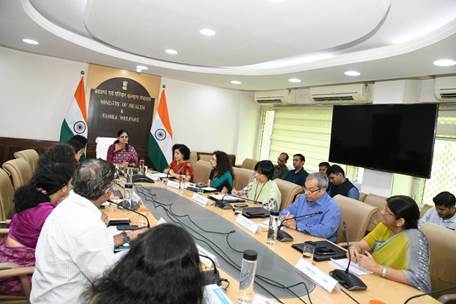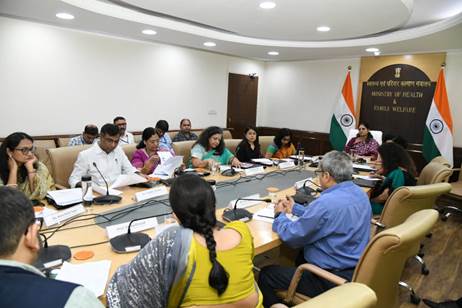New Delhi, Delhi, 19th of July, 2024 : In continuation of the World Population Day observance, the Union Minister of State for Health and Family Welfare, Smt. Anupriya Patel held a meeting with public health experts today. The theme of the event was “Reaching the Last Mile for Ensuring Healthy Timing and Spacing between Pregnancies: Issues & Challenges.”
Highlighting the importance of healthy timing and spacing of pregnancies, the Union Minister stated, “Adequately spaced pregnancies can significantly enhance maternal and child health outcomes. This reduces health risks and empowers women and families to make informed choices about their reproductive health”. She also emphasized that the Government has always been conscious of these issues. “The launch of initiatives such as the Pradhan Mantri Surakshit Matritva Abhiyan (PMSMA), Extended PMSMA, identification of High-Risk Pregnancy in PMSMA, Anemia Mukt Bharat Abhiyan, and the Post-Partum Family Planning Programme (Post-Partum IUCD and Post Abortion IUCD) are some examples of the Government’s commitment to the cause”, she added. She further added that “the government’s efforts have resulted in reduction of maternal mortality from over 130 to 97 per one-lakh births.”

The Union Minister also highlighted the efforts taken by states on their own to bring about the involvement of men in family planning. She also underscored the importance of an effective communication strategy. “The task of achieving Viksit Bharat by 2047 cannot be done without empowering our women. Healthy timing and spacing between pregnancies are very important for women’s health”, she added.
Smt. Aradhana Patnaik, Addl. Secretary and Mission Director (NHM), MoHFW highlighted that India has already achieved a TFR of 2.0 with 31 States/UTs achieving replacement level. However, she pointed out the need for an effective strategy to bring the TFR under replacement level in the five remaining states.

Public Health Experts who were present in the event included Dr Kalpana Apte, Head, Family Planning Association, India; Dr Saswati Das, Sexual and Reproductive Health Specialist, UNFPA India; Dr Chander Shekhar, Professor and Head of the Department of Fertility and Social Demography at the International Institute for Population Sciences (IIPS), Mumbai; Ms. Moni Sinha Sagar, Division Chief for the Family Health/RMNCHA Division, USAID India; Dr Somesh Kumar, Country Director, Jhpiego India; Prof Sudha Prasad, Director and Chief of Matritava Advanced IVF & Maternity Centre, Gurugram; and Dr S K Sikdar, Ex Advisor (Family Planning & Maternal Health), MoHFW, Government of India.
Discussions ranged across a myriad of topics impacting family planning services, from equal participation of men and women in family planning and the use of data in family planning to global best practices and their applicability in India. Participants also shared learnings and proposed strategies, future horizons for newer contraceptives, and their experiences with family planning program.
Prof. Sudha Prasad shed light on various causes of maternal mortality, nutritional deficiencies due to inadequate spacing between pregnancies, and the importance of spacing between children. She emphasized on the need for providing the full range of contraceptive options to women and couples to reduce the risk of unwanted pregnancies.
Dr. Kalpana Apte spoke about traditional gender norms in India and emphasized the need for male participation in family planning as a priority. She also stressed on the need to increase couple communication and male grassroot level support for talking to men on family planning.
Ms. Moni Sinha Sagar underscored the importance of expanding the basket of choices and introducing newer contraceptives like hormonal IUDs, and vaginal rings. She highlighted that the NFHS-5 data shows accomplishments in a lot of areas, however challenges remain on high occurrence of teenage pregnancies and use of traditional methods of contraception.
Dr. Somesh Kumar and Dr. Saswati Dasshared their views on global experiences in increasing the reach of the Family Planning program. They highlighted the importance of three pillars: service delivery, social and behaviour change, and creating an enabling environment. Dr Somesh highlighted the need for reaching out to the youth for the use of newer contraceptives.
Dr. Chander Shekhar discussed about geographic disparities in contraceptive use and unmet need for Family Planning amongst youth. He said that discontinuation rates and inadequate information about modern contraceptive methods diminishes family planning efforts.
Dr. S.K. Sikdar shared his experiences of the Family Planning program, where he narrated the achievements of National Family Planning Programme and the future activities that may be undertaken for improvising healthy timing and spacing of pregnancies.
All the speakers unanimously voiced that equipping adolescents with accurate and judgment-free information about contraceptive options is essential for enabling informed decision-making and improving accessibility to family planning and reproductive health choices.

The Union Minister appreciated the experts for their commitment to the cause and noted that by empowering youth, addressing the challenges of equal participation of men and women, increasing couple communication, learning from best practices, taking cues from current and historical trends in family planning data, and expanding the contraceptive basket of choices, we would be able to reach the last mile.
She also emphasized that identifying and mapping regions, districts, and blocks with low uptake of family planning services, low demand for modern contraceptives, high unmet needs, and similar state-appropriate criteria, and saturating them with family planning services, enhanced social and behaviour change communication, and involving frontline workers in these efforts can be a possible roadmap to achieve successful desired outcomes.
Smt. Meera Srivastava, JS (RCH) and senior officials of the Union Health Ministry were present in the meeting.










More Stories
HP Government Join Hands With Piramal Foundation To Launch Social, Emotional & Ethical Learning In The State.
PM Addresses Rojgar Mela Through Video Conferencing, Distributes More Than 71,000 Appointment Letters To Newly Appointed Recruits.
The Government Has So Far Spent Rs 1166 Lakh Crore On Various Ongoing Schemes Under The National Food Security Programme: Shri Chouhan.